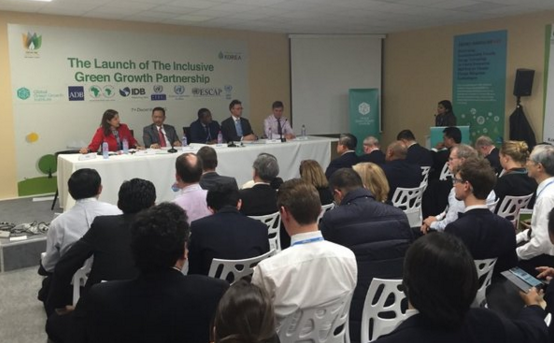The Paris climate change conference was a great success for the Global Green Growth Institute (GGGI) in many ways, bringing new opportunities going forward and opening the door for partnerships and collaboration with multilateral development banks and the United Nations regional commissions to support developing countries to secure the climate finance they need to move towards a low-carbon, sustainable future.
COP21 served as a platform for GGGI to engage with its Members and present its vision for promoting and facilitating green investments to a wider audience through organizing events and participating in numerous activities. A good example is the launch of the Inclusive Green Growth Partnership (IGGP), which attracted a crowd of more than 150 attendees. The IGGP event enlightened many participants to realize the importance of mobilizing green financing in developing and emerging countries to help them to transition to low emission and climate resilient economies. The Partnership, which is a joint initiative of GGGI together with Multilateral Development Banks (MDBs) and UN agencies, aims to provide new finance solutions for developing countries to help them deliver on Sustainable Development Goals and Intended Nationally Determined Contributions (INDCs).
What GGGI can offer is technical expertise to assist MDBs to identify green growth opportunities and investments by working closely with emerging economies and Least Developed Countries (LDCs). GGGI can support the implementation of the Paris commitments through bankable projects and by building domestic green finance institutions. The organization works with governments to help them achieve their growth goals of real inclusive and sustainable change for their people and the environment and help countries to develop green growth plans that are "bankable" - projects that meet investor criteria and that will be implemented.
Developing countries are concerned about how they will fund their efforts to deal with climate change. The world is awash with money. Sufficient capital is available at a global level. The conviction of GGGI is to promote ambition by calling for action, and in order to enhance action there needs to be finance. GGGI organized an event called 'Three Steps to Green Finance' to examine how national and international financial institutions and project development are related, focusing on the role that domestic financial institutions play in project development and leveraging international finance, with a view to both public and private sources of finance. Discussions revolved around three areas to secure green finance: innovative international finance, national instruments and bankable projects. During the panel discussion, senior government representatives from three GGGI Member countries - Costa Rica, Ethiopia, and the Philippines - highlighted their country's strategy for mobilizing green finance to implement programs and projects that reflect and are in line with their respective visions of green growth. Promoting green investments requires looking at the linkages between international and domestic sources of finance and bankable project pipelines. The event provided an opportunity to look at national and international barriers to financing green projects and ways to overcome challenges.
GGGI took part in the Nationally Appropriate Mitigation Actions (NAMA) Fair, which was organized by the UNFCCC Secretariat to inspire transformational action on the ground by showcasing how country-driven sustainable development initiatives are moving developing countries along a low-carbon development trajectory. The NAMA Fair offered an opportunity to step forward and take global engagement towards effective implementation. It also allowed participants to better understand how NAMAs, and the financing for NAMAs, can be connected more effectively and verifiably to the development goals of each country.
In the margins of the Paris summit, GGGI Members reaffirmed their commitment to promoting green growth and transitioning to low-carbon economies. GGGI and the Government of Rwanda signed a MoU in support of the country's efforts to build a green and sustainable economy. The agreement will boost cooperation through technical support and capacity building so that Rwanda is better able to conserve its natural environment and build climate resilience. Hungary became the 25th member country of GGGI after formally signing the Agreement of Establishment in Paris. In addition, GGGI signed a funding agreement with Mexico and agreed to expand cooperation with Costa Rica. Germany, Norway and the United Kingdom have agreed to contribute 100 million USD to support Colombia's Reducing Emissions from Deforestation and Forest Degradation (REDD+) efforts to reduce deforestation in the county's Amazon forests. GGGI is encouraged by the strong commitment demonstrated by the international donors and pleased to have worked closely with Colombian government partners in the development and financing of strategic initiatives that will help preserve valuable forest resources and drive green growth in the Amazon.
GGGI will continue to engage closely with its Members while seeking new opportunities with non-member countries. GGGI hopes to play a pivotal role in not only supporting developing and emerging countries to transition to green and low-carbon economies, but to help them build capacity to develop bankable projects and secure climate finance.
